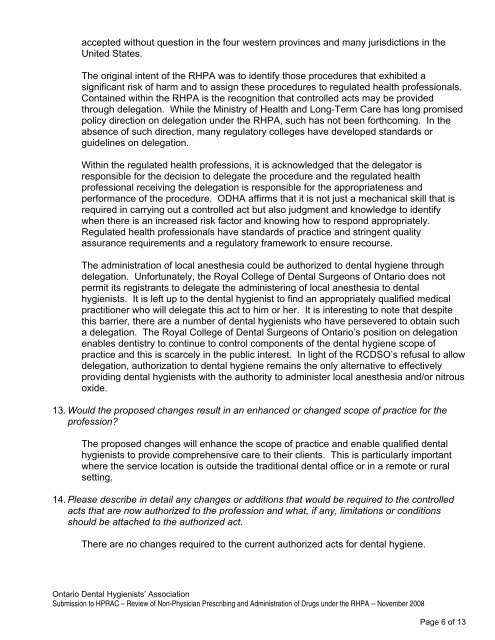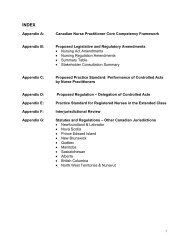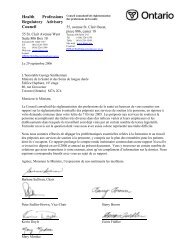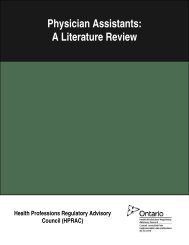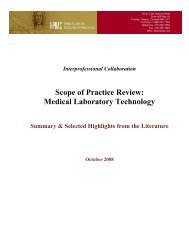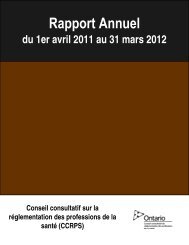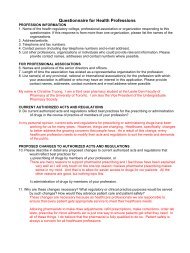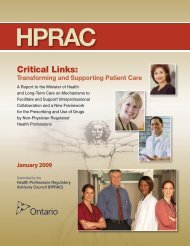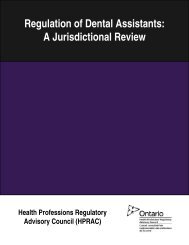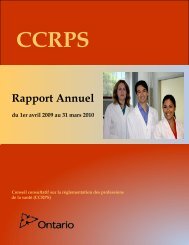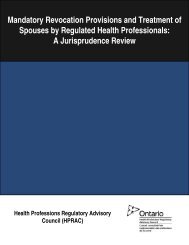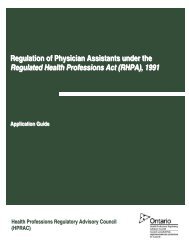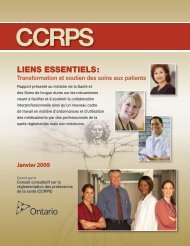Questionnaire for Health Professions
Questionnaire for Health Professions
Questionnaire for Health Professions
Create successful ePaper yourself
Turn your PDF publications into a flip-book with our unique Google optimized e-Paper software.
accepted without question in the four western provinces and many jurisdictions in theUnited States.The original intent of the RHPA was to identify those procedures that exhibited asignificant risk of harm and to assign these procedures to regulated health professionals.Contained within the RHPA is the recognition that controlled acts may be providedthrough delegation. While the Ministry of <strong>Health</strong> and Long-Term Care has long promisedpolicy direction on delegation under the RHPA, such has not been <strong>for</strong>thcoming. In theabsence of such direction, many regulatory colleges have developed standards orguidelines on delegation.Within the regulated health professions, it is acknowledged that the delegator isresponsible <strong>for</strong> the decision to delegate the procedure and the regulated healthprofessional receiving the delegation is responsible <strong>for</strong> the appropriateness andper<strong>for</strong>mance of the procedure. ODHA affirms that it is not just a mechanical skill that isrequired in carrying out a controlled act but also judgment and knowledge to identifywhen there is an increased risk factor and knowing how to respond appropriately.Regulated health professionals have standards of practice and stringent qualityassurance requirements and a regulatory framework to ensure recourse.The administration of local anesthesia could be authorized to dental hygiene throughdelegation. Un<strong>for</strong>tunately, the Royal College of Dental Surgeons of Ontario does notpermit its registrants to delegate the administering of local anesthesia to dentalhygienists. It is left up to the dental hygienist to find an appropriately qualified medicalpractitioner who will delegate this act to him or her. It is interesting to note that despitethis barrier, there are a number of dental hygienists who have persevered to obtain sucha delegation. The Royal College of Dental Surgeons of Ontario’s position on delegationenables dentistry to continue to control components of the dental hygiene scope ofpractice and this is scarcely in the public interest. In light of the RCDSO’s refusal to allowdelegation, authorization to dental hygiene remains the only alternative to effectivelyproviding dental hygienists with the authority to administer local anesthesia and/or nitrousoxide.13. Would the proposed changes result in an enhanced or changed scope of practice <strong>for</strong> theprofession?The proposed changes will enhance the scope of practice and enable qualified dentalhygienists to provide comprehensive care to their clients. This is particularly importantwhere the service location is outside the traditional dental office or in a remote or ruralsetting.14. Please describe in detail any changes or additions that would be required to the controlledacts that are now authorized to the profession and what, if any, limitations or conditionsshould be attached to the authorized act.There are no changes required to the current authorized acts <strong>for</strong> dental hygiene.Ontario Dental Hygienists’ AssociationSubmission to HPRAC – Review of Non-Physician Prescribing and Administration of Drugs under the RHPA -- November 2008Page 6 of 13


